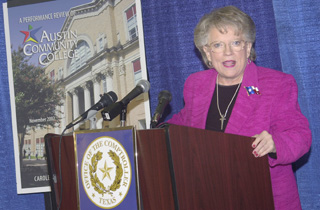Your Neighbors, Your Money: ACC Looks for Support
Austin Community College seeks to build support for a tax referendum even as a state audit blasts ACC leaders.
By Michael King, Fri., Dec. 6, 2002

As you might guess from the "Our Faculty, Your Neighbors" campaign featured in ads and on billboards all over town, Austin Community College is trying to spruce up its image. There's a good reason -- the college administration will ask local voters next spring to approve a property tax increase. The referendum, as approved Monday by the college trustees for a vote next May, will seek to raise ACC's tax rate cap incrementally (through 2005) from 5 to 9 cents per $100 assessed valuation -- potentially a total increase of about $30-$40 for the average Austin homeowner -- and to issue $99 million in facilities bonds.
That's not a huge jump, but voters turned down a very similar proposition in November 1999. In the interim, two new challenges have arisen for ACC: the abrupt downturn in the economy, and an equally severe hit to the college's public image after noisy battles between the administration of President Richard Fonté and much of the ACC community. For months, struggles over ACC's governance, vision, and accounting dominated the headlines, and last spring's election for the ACC board of trustees was in some measure a referendum on Fonté and the administration. Even in a town normally enthusiastic about education, the referendum looks like anything but a slam-dunk.
Adding high-octane fuel to the bad-PR pyre, the day before Thanksgiving state Comptroller Carole Keeton Rylander held a press conference (at ACC's downtown Rio Grande Campus) to announce the results of her agency's Texas State Performance Review of the college. It's fair to say the review is mixed. This final version of Rylander's audit -- following a draft released in September -- incorporates many minor factual corrections requested by the ACC administration, but its substantive recommendations remain much the same. The TSPR is enthusiastic about the school's "stellar instructional and academic programs," but offers stern criticism of the administration. Indeed, the reviewers found bickering at the school to be so severe that they recommend ACC immediately hire an independent mediator to make peace among its warring factions. "The ACC faculty and president do not work well together," the report finds, "and the relationship between the two has deteriorated to the point that both parties are unable to focus on current issues."
Rylander's audit also identifies (in theory) roughly $14 million over five years in potential savings -- trimming some redundant administrative positions, increasing the average class size (thereby eliminating what she called "excess faculty"), and cutting back on district-wide mailings of the course catalog. Asked whether those savings would eliminate the need for an ACC tax hike, Rylander declined the bait, only repeating, "I'm a firm believer in local control."
An hour after Rylander's press conference, the college held its own media event, at which board Chair Rafael Quintanilla and then Fonté thanked the comptroller and her staff for helping the college toward better "efficiency and effectiveness" and for "celebrating what we do well." Fonté said he is "more than open" to the suggestion of hiring a mediator and streamlining college expenses. But both administrators noted that the average class size has already increased since the auditors began their work -- the review was based on a total enrollment of 28,000, and last semester the college served roughly 31,000 students. (That abrupt 11% jump in enrollment undercut at a stroke the TSPR's largest projected "savings" -- more than $9 million over five years in "excess faculty" costs.) Quintanilla pledged that the college is getting its "internal house in order" -- but both he and Fonté reiterated that the college cannot respond to increasing demand for services without "additional resources [and] strengthened community support."
Can ACC regain sufficient public trust by spring to persuade voters to provide those additional resources? In an interview, Fonté insisted that internal college relationships are much improved, that the adjunct faculty has responded positively to a program of "shared governance," and that the especially dissatisfied full-time faculty is coming around. (Of roughly 1,600 ACC instructors, part-time adjuncts outnumber full-time faculty three to one.) In any case, Fonté says his performance should not be an issue in the campaign, since he has already announced he'll retire from ACC at the end of 2004. "This is about the future of the institution," said Fonté. "We need to come together for the best interests of the college -- as an institution and as a united community."
With the state steadily reducing its support for community colleges and with UT-Austin planning to cap its enrollment, there's no doubt ACC will need more funds to serve the 10,000 additional students expected by 2010. Administrators say the new revenue would allow for more sections of currently oversubscribed classes, as well as for expanding and renovating ACC facilities -- including buying (from Austin ISD) and renovating the Rio Grande Campus. According to administration projections, without new money, not only will ACC be unable to expand, but by 2006 the school will be nearly $10 million in the red. Said Matthew Daude, chair of both the philosophy department and the college's Shared Governance committee, "The idea that we have 'excess faculty' is absurd."
The faculty appears to agree that ACC needs additional support. Yet some instructors remain uneasy, despite Fonté's reassurances, about the college's current management. Don Morris, president of the Adjunct Faculty Assoc., gives his "full support" to the tax referendum, adding that in light of Fonté's pending retirement, the president has become "really a moot question." "We all have common goals," said Morris, "and we all want the college to succeed in its mission." But Myra Bradley, president of ACC's chapter of the American Federation of Teachers, acknowledges that college resources are strained but says the union has yet to take a position on the referendum and probably will not do so before early next year.
Other teachers say they are torn about the tax vote; one full-time faculty member told the Chronicle that he strongly supports the school but "just doesn't trust" Fonté and doubts that he could vote for the referendum as long as Fonté is in charge. The college has five months to persuade voters that with or without Fonté, ACC is worth the additional investment.
Got something to say on the subject? Send a letter to the editor.








